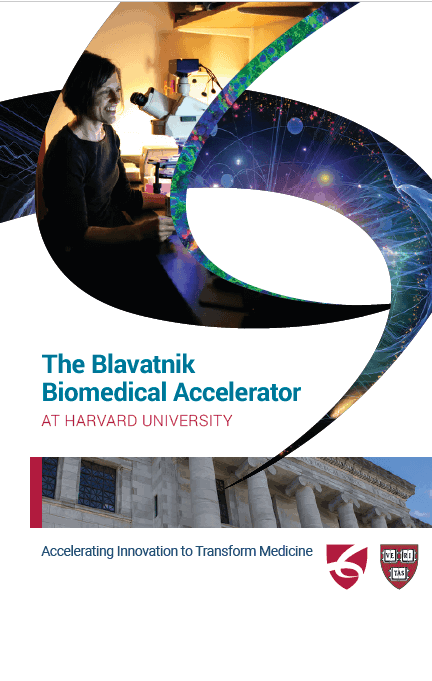
 Blavatnik Biomedical Accelerator
Blavatnik Biomedical Accelerator
From innovation to impact
Biomedical research at Harvard has the potential to improve countless lives, revolutionize industries, and create immense social and economic value. Translating this early-stage research into compelling, validated technologies requires careful planning, focused resources, and a tireless pursuit of results.
The Blavatnik Biomedical Accelerator guides Harvard scientists toward translational impact by providing strategic, monetary, and advisory support for well-defined research projects. Our work is expressly aimed at hastening the pace of scientific progress, developing a shared vision with partners in industry, and ensuring that lifesaving technologies born at Harvard will become new products that impact the world for the better.
Read about the 2025 research projects supported by BBA below, as well as previously funded projects here, or find out how to apply for funding in 2026.
Accelerating innovation to transform medicine
In this video created by the Blavatnik Family Foundation in 2020, learn how the targeted funding and strategic advising of the Blavatnik Biomedical Accelerator at Harvard University is helping Harvard scientists to understand disease and advance new treatments that may save lives.
The Request for Proposals for funding in 2026 is now available. Find out how to apply for funding in 2026.
The Blavatnik Biomedical Accelerator was established through a major gift from the Blavatnik Family Foundation.

Proving the value of big ideas
The Accelerator seeks to support innovative, investigator-initiated research, and to develop preliminary observations into robust intellectual property positions. Its primary goal is to advance technologies to the point where an industry partnership can commence.
We employ a proven strategy of selecting projects with significant commercial potential, and providing financial support and domain expertise to fuel translational research, proof-of-concept, and technological development. We simultaneously build relationships with industry, generating partnerships and licensing opportunities, and facilitating startup formation and investment.
New projects in 2025
In labs across Harvard University, 10 innovative research projects received new support from the Blavatnik Biomedical Accelerator in 2025. Our investigators are advancing crucial translational work in the areas of cell and gene therapy, infectious and inflammatory diseases, platform technologies, and medical devices. The Accelerator support will move them to an inflection point where they will be ready for commercial partnership. To learn more, please contact us.
Cell and Gene Therapy
In Vivo Gene Transfer for Inducing Immune Tolerance to Therapeutic Proteins
Amy Wagers
Forst Family Professor of Stem Cell and Regenerative Biology, Faculty of Arts and Sciences
Generation of Extracellular Vesicles for Efficient RNA Delivery
Constance Cepko
Bullard Professor of Genetics and Neuroscience, Blavatnik Institute at Harvard Medical School
Engineering Erythroid Cell Lines for Universal Transfusion-Compatible RBC Production
Manoj Duraisingh
John LaPorte Given Professor of Immunology and Infectious Diseases, Harvard T.H. Chan School of Public Health
Development of ASOs for Site-Directed RNA Editing
Matthew Shair
Professor of Chemistry and Chemical Biology, Faculty of Arts and Sciences
Infectious and Inflammatory Diseases
Targeting the Peripheral Differentiation of Immunoregulatory pTreg Cells
Christophe Benoist
Morton Grove-Rasmussen Professor of Immunohematology, Blavatnik Institute at Harvard Medical School
Enhancing Food Allergy Treatment By Blocking the Activity of Monocyte-Derived Dendritic Cells
Kari Nadeau
John Rock Professor of Climate and Population Studies; Chair, Department of Environmental Health, Harvard T.H. Chan School of Public Health
Platform Technologies
Novel Technologies for Extracellular Protein Degradation
Stephen Blacklow
Gustavus Adolphus Pfeiffer Professor of Biological Chemistry and Molecular Pharmacology, Blavatnik Institute at Harvard Medical School
Developing a Novel Strategy for Constructing Rapid and Homogeneous Antibody-Drug Conjugates
Richard Liu
Assistant Professor of Chemistry and Chemical Biology, Faculty of Arts and Sciences
Medical Devices
A Minimally-Invasive Device to Treat Metabolic Diseases
Shriya Srinivasan
Assistant Professor of Bioengineering, Harvard John A. Paulson School of Engineering and Applied Sciences
Flexible Nanoelectronics for Safer, Smarter Adaptive Atrial Fibrillation Termination
Richard Lee
Professor of Stem Cell and Regenerative Biology, Faculty of Arts and Sciences
